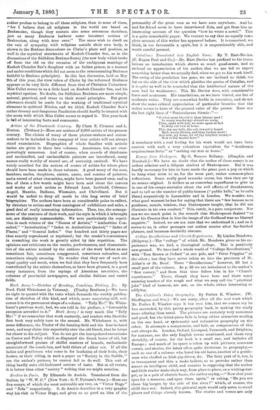Catalina : Translated into English Verse. By T. Hart-Dai ies.
(C. Kegau Paul and Co.)—Mr. Hart-Davies has prefixed to his trans- lations an introduction which shows so much good-sense, and so rational an appreciation of his author, that we are led to expect something better than we actually find, when we get to his work itself. The swing of the pendulum has gone, we are inclined to think, too far on the side of the view which glorifies the genius of Catalina, and it is quite as well to be reminded that the intellectual nature of the MEM had its weaknesses. This Mr. Davies does, with considerable force and acuteness. His translations, as we have hinted, are but of moderate value. They are somewhat feeble in execution, and do not show the same critical appreciation of particular beauties that the writer seems to have of the general value of the poems. Here are the last eight lines of " Peninsularum Sirmio :"— " 0 what more bleseed is than labours past ! In weary wanderings abroad we roam, Then, spent with toil, we come again at last Seeking our most at home.
This, for our toils, the sole reward is found.
Hail, lovely Sirmio, and thou Lydian mere ! And now, my home, let all thy laughter sound,—
Now is thy master here."
A translator with a real feeling for his work would not have been content with such a very colourless equivalent for " desiderato acquiescimus lecto " as "seeking our rest at home."










































 Previous page
Previous page